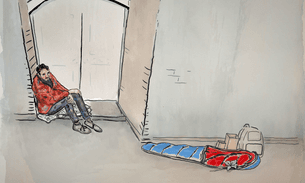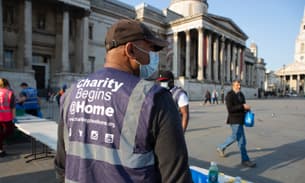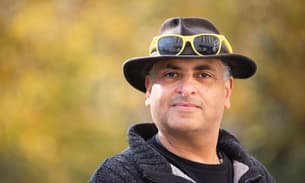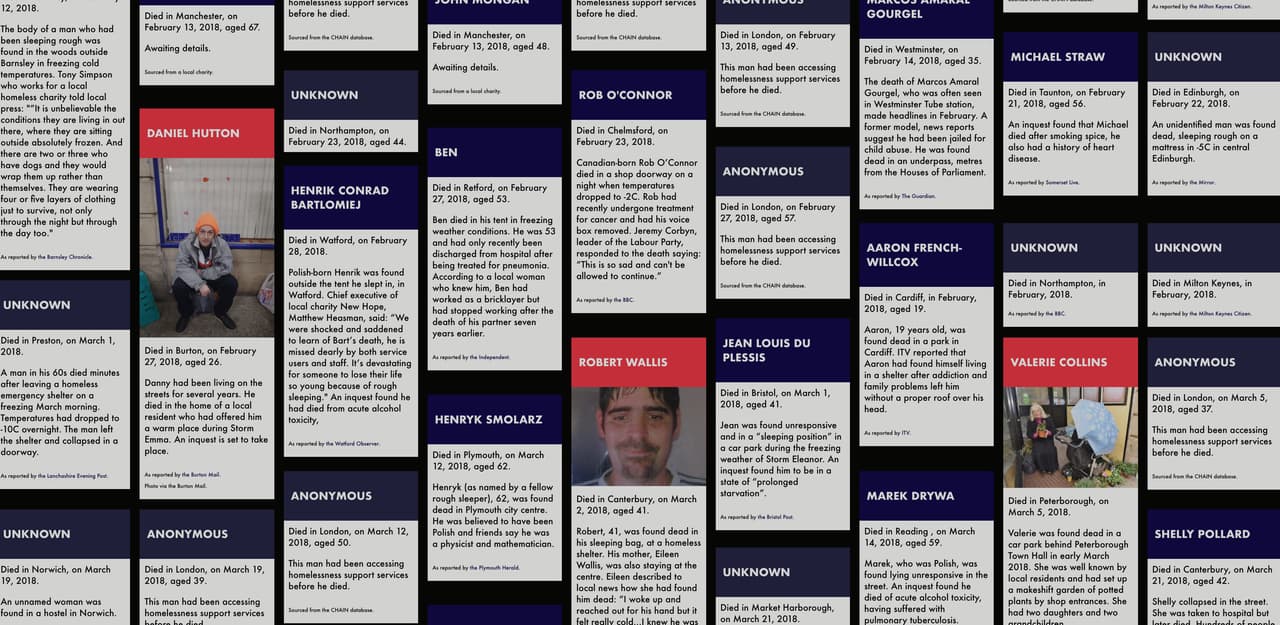
“Utterly shocking” - how UK-wide collaboration revealed number of homeless deaths
Last week, we revealed the shocking fact that at least 449 people had died homeless across the UK in the last year. The figure, which made headlines around the country, was the first UK-wide count of the number of people who die homeless. Since we published last week we've heard of 19 more deaths taking our total count since October last year to 468.
We resolved to log these deaths after discovering that no one else did. But with no official data collection it was not easy. We spent eight months talking to scores of people: doctors, charity workers, family members, coroners, soup kitchens, anyone we thought could help us record details of the homeless who had died on the streets, in hostels and in temporary accommodation.
From the start we asked our Bureau Local network for help, and the count became a truly collaborative effort. By the time we published our results last week, more than 30 journalists across the country had investigated homeless deaths in their area and fed their information into the national database.
The story, which went out on Channel 4 News on October 8, was picked up by dozens of outlets including the Guardian, Big Issue, BBC News, HuffPost, the Mirror, the Daily Record and the Belfast Telegraph. In total, there have been 29 national and 42 local articles covering the issue so far. Regional and national homelessness charities have also used and publicised the findings.
Along with the figures, we broke the news that the Office for National Statistics had been reviewing our data and was now preparing to release its own estimate of homeless deaths later this year. We set out with a call to #MakeThemCount, and now, nine months into our project, this is finally happening.
James Brokenshire, Secretary of State for Housing, Communities and Local Government, responded to our findings saying they were “utterly shocking.”
“It does not reflect the modern Britain that I know that we are, that we need to be,” he said. “That’s why I think it is so important we understand what has caused those deaths, so actually having serious case reviews which have not been done effectively beforehand.”
We also revealed during the course of our investigation that reviews into homeless deaths are hardly ever carried out. Safeguarding Adults Review Boards, part of local authorities, have a duty under the Care Act to investigate any death of an adult with support needs who dies as a result of abuse or neglect - but only eight such reviews had been carried out into homeless deaths between 2010 and early 2018.
In March, as part of the government’s new Rough Sleeper Strategy, it recommended for the first time that all local authorities carry out reviews into homeless deaths whenever abuse or neglect is suspected. Citing our work, Leeds City Council’s Safeguarding Adults Board also announced it would carry out a thematic review into a number of homeless deaths.
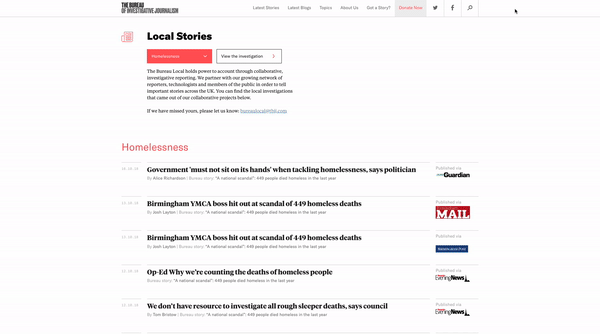 The local stories published as part of this investigation are published on our website at tbij.com/projects/homelessness/local-stories
The local stories published as part of this investigation are published on our website at tbij.com/projects/homelessness/local-stories
Politicians speak out
After the figure of 449 was revealed, politicians across the country spoke out. Conservative Norwich North MP Chloe Smith said: “Any death is a tragedy and rightly no one should be overlooked or forgotten,” while Andy Burnham, mayor of Greater Manchester told the Manchester Evening News that the scale of homeless deaths “is nothing short of a humanitarian crisis.”
Scottish Labour called the scale of deaths in Scotland “horrifying”, while Green Party South Belfast MLA Clare Bailey told Northern Irish outlet The Detail: “I just think they are really brutally shocking statistics. I have never seen those numbers before.”
Others took to Twitter to voice their concerns, like Rosie Duffield, Labour MP for Canterbury, Whitstable and Villages, who wrote: “This is disgusting in 2018. No excuse is good enough.” Matt Western, Labour MP for Warwick and Leamington, tweeted: “This is an utter disgrace and an indictment of #austerity”.
Labour leader Jeremy Corbyn tweeted a link to the story saying: “These people were tragically failed by this Tory Government. @Theresa_May and every Tory needs to read this.
Jon Sparkes of Crisis said he was “deeply saddened and shocked beyond belief to hear of the deaths of all these individual,” while Howard Sinclair, St Mungo’s Chief Executive, said “These figures are nothing short of a national scandal”. Alex Bax, Chief Executive of Pathways told the Bureau “These difficult findings echo the words of homelessness clinicians: too many homeless people are dying early, in painful, tragic circumstances.”
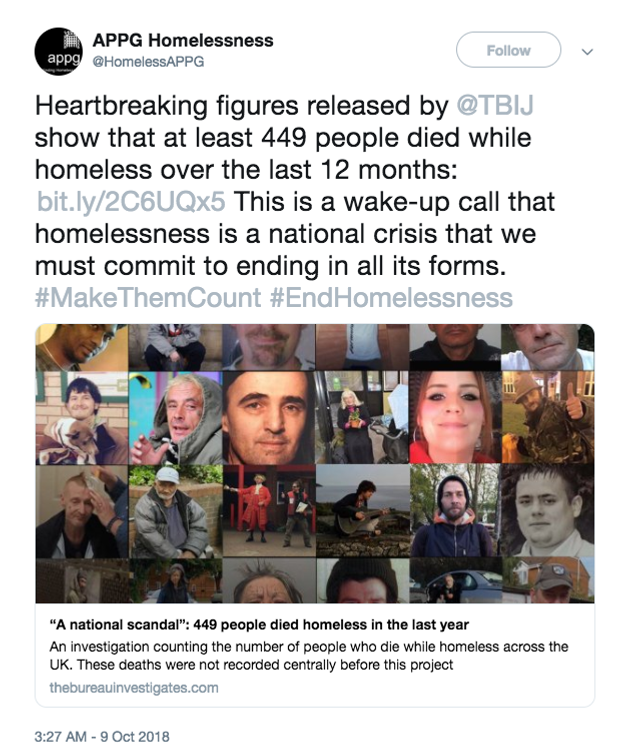
How we did it
The project, titled Dying Homeless, started back in February after a series of homeless deaths made headlines when icy storms hit the UK. Those stories got me thinking - I knew that there had been a huge increase in homelessness, with the number of rough sleepers in England and Wales rising by 169% since 2010, but I wondered how often were people dying homeless?
What I thought was a simple question turned into weeks of calls and enquiries to coroners’ offices and councils, hospitals or police - it turned out no one kept a comprehensive record of these deaths.
So the Bureau set out to do so. I searched out information on how and when people were dying. I sat quietly in funerals, talked to family members, collected coroners’ reports, travelled to doctors’ surgeries, shadowed homeless outreach teams, contacted soup kitchens and hostels and compiled scores of Freedom of Information requests.
But we couldn’t do it it alone. The Bureau Local was set up with the belief that regional journalism is a crucial part of a healthy society and that collective reporting produces broader and deeper investigations than would be possible by any individual newsroom. This project was the perfect example.
We knew that many of these deaths never made it onto the national radar, but many were reported at a local level. Indeed about a quarter of all the 449 deaths we logged, and the human stories behind the numbers, came from local news reports that we found, proving what a valuable role local papers have to play.
We also worked directly with our amazing network of journalists and collaborators across the UK, who got stuck in to exploring and reporting on deaths in their area.
Rory Winters, from The Detail in Northern Ireland, worked with us to reveal that 148 people had died homeless while waiting to be housed by the Northern Irish Housing Executive. One local politician called the figures “brutally shocking".
In Scotland, Karin Goodwin who reports for The Ferret spoke to charities and experts across the country and found that at least 94 people had died in the last year. Michael Yong from the Bristol Post did equally impressive work and managed to log the names of 50 people that had died homeless in the last five years in his city.
We asked them to submit all their findings through an online form, which we worked to cross-check and verify. The reporting also formed the basis for many powerful features in regional papers, telling the stories of those who died and investigating the particular issues in their local area.
Use the map below to explore the Dying Homeless journalism across the country.
And you can find every single local story that was published here.
Homeless charities and outreach teams were also vitally helpful. In London, Housing Justice, Streets Kitchen and St Mungo's helped us put names together, while doctors from Edinburgh and Brighton also gave us insights into deaths in their cities. House of Bread in Stafford let us in to see their work, while the Big Issue helped us link up with those that knew vendors that had died.
Together we put together a tragic jigsaw, and tried to tell the stories of those that lost their lives in the past year.
It has been a long road but it is not over yet, the Bureau will keep recording names of people that pass away throughout the winter and will keep working with our network so we can continue to #MakeThemCount. If you want to join us, get in touch.

